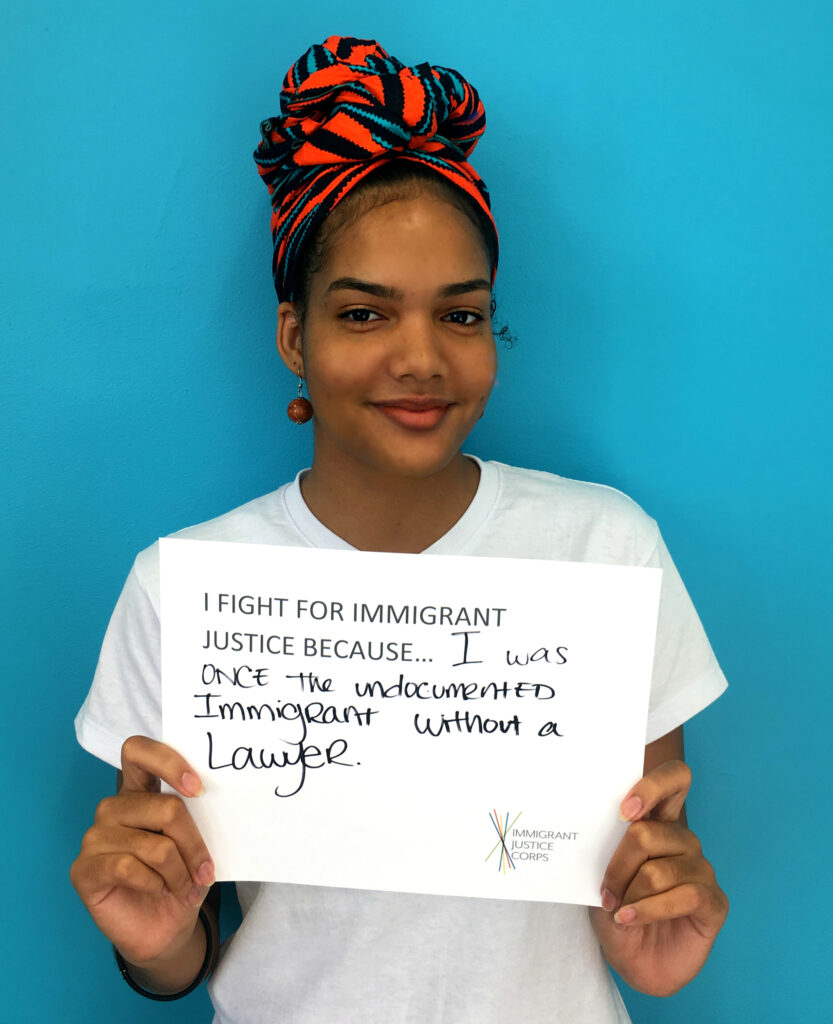The power of representation
Last week the Executive Office for Immigration Review (EOIR) released a memo spreading blatantly biased misinformation about people seeking asylum, the impact of legal representation in the immigration court system, and the function of the system itself. We remain shocked that a purportedly neutral adjudicative agency would release this propaganda. We are outraged by the memo’s false claim that representation is of little consequence to the legal outcome of these cases.
Overall, immigrants who have representation are 1,100% more likely to have successful outcomes compared to those without representation. Immigrant Justice Corps (IJC) was created to close this jarring representation gap and ensure all immigrants have access to justice. Since 2014, IJC has assisted nearly 50,000 immigrants and their family members with a 93% success rate. Representation matters, especially in cases that literally mean life and death.
We believe that the power of our clients’ unique stories must not be ignored. Asylum cases can often take years to be resolved. For our Fellows, this means closely collaborating with their IJC co-Fellows to ensure that knowledge is preserved when cases are passed on and that the client is supported throughout all stages of the process. Kareem* is an IJC client for whom quality legal representation made all the difference.
Kareem sought asylum in the United States after arriving from his home country of Yemen on a diplomatic visa. He applied for asylum based on the persecution he faced from the Houthi militant groups who gained significant power in Yemen following the outbreak of civil war in March 2015.
In Yemen, Kareem had developed a strong reputation as a liberal pro-democracy activist who played a lead role in several organizing collectives. Houthi militants began targeting Kareem for his political activities, and in an attempt to silence him, they kidnapped and tortured him, threatening to do the same to his family if he did not denounce his politics.
Kareem complied enough to save his life, but in an attempt to coerce his full support for their uprising, the Houthis kidnapped his two children. After fortunately coordinating their release, Kareem was able to escape Yemen and secure temporary housing in India for his ex-wife and children.
He first met with Susanna Booth, a Community Fellow at Arab American Association of New York (AAANY), in the spring of 2016 for an intake. After speaking with Kareem about his desire to apply for asylum, Susanna referred him to Christina Elhaddad, a former Justice Fellow at AAANY.
Christina prepared and filed his asylum application with the United States Citizenship and Immigration Services (USCIS) in the summer of 2016. In August of 2017, Susanna, who inherited Kareem’s case, filed an expedite request to adjudicate his application, as the lives of Kareem’s family in India became increasingly and perilously tied to his asylum application.
Believing it is dishonorable for Kareem’s ex-wife to remain alone in India, members of her family threatened to forcibly repatriate her and her children to Yemen, which had become even more dangerous. The Houthis had consolidated their power and gained significant control of the Yemeni capital, Sanaa. Reports that the Houthis were detaining and torturing political activists like Kareem continued to flood local news programs. Additionally, his children’s status in India was about to expire soon, leaving them no choice but to return to Yemen. The likelihood of the Houthis kidnapping his children a second time to lure Kareem back was dreadfully high.
Fortunately, the request to expedite was approved, and Kareem had his first asylum interview in October 2017. Susanna accompanied Kareem to his interview and the asylum officer told them to expect a decision in the mail. Hopes were high that he was close to the end of this long, painful process.
However, despite sending numerous case inquiries to the asylum office, escalating the issue to USCIS leadership, and soliciting help from two U.S. congressional representatives, Kareem received no information about the status of his case for an entire year.
In October 2018, a few months after Susanna graduated from IJC and enrolled at Columbia Law School, we received a second interview notice for Kareem. Community Fellow Jonathon Burne, who replaced Susanna, took over the case and accompanied Kareem to this second interview in November, and were told yet again to expect a decision in the mail. With the anguish and uncertainty of his family’s situation in India weighing on him, coupled with the traumatizing impact of re-telling his story of persecution, Kareem anxiously awaited a decision.
In February 2019, Jonathon submitted yet another request to expedite, detailing the severity of the humanitarian situation that the USCIS delays continued to exacerbate.
Finally, in March 2019, Jonathon received a letter from USCIS granting Kareem asylee status! Jonathon is now working quickly to submit the appropriate paperwork to reunite Kareem with his children, who he has not seen in almost half a decade.
The work of our Fellows, as lawyers and as Department of Justice (DOJ) accredited representatives, is invaluable within a system that seeks to demonize and marginalize the immigrant community.
Your support of IJC in the face of hostile rhetoric and violent processes is so important. We will continue to share inspiring stories that are a testament to the resilience of immigrants and the power of representation.
*not his real name
